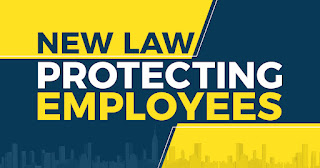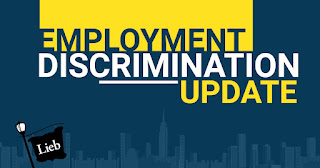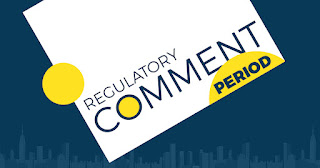Tuesday, January 03, 2023
Monday, November 28, 2022
In New York State and under the New York State Human Rights Law, a discrimination lawsuit generally must be commenced within three-years of the wrong complained of for the lawsuit to be timely and actionable.
However, a federal employment discrimination case must be filed with the Equal Employment Opportunity Commission (EEOC) within 300 days of the wrong for a federal claim, under Title VII, to be actionable. Yet, no federal lawsuit can be filed until the EEOC issues a right to sue letter.
So, what happens when an employee wants to file both a federal and state claim? Specifically, what happens if the right to sue letter isn't issued until after the expiration of the three-year New York State deadline?
The Appellate Division, First Department, just answered that question in Gabin v Greenwich House, Inc.
The court ruled that NYS Administrative Code section 8-502(d) tolls (a/k/a, freezes) the counting of the three-year period under state law during the period from when a charge is first filed with the EEOC until the right to sue letter is issued.
Tuesday, September 27, 2022
Did you know that employees of the federal government have special rules to sue their employer for employment discrimination? For example, these employees only have 45 days to initiate their complaint after the discriminatory event or they are foreclosed from bringing a case.
Now, the Equal Employment Opportunity Commission (EEOC) is proposing an amendment to the regulation that governs these types of discrimination cases, 29 CFR 1614.
The proposed amendment is a step forward by embracing the EEOC's Electronic Public Portal, but it's not nearly enough for these employees who are often a day late and a dollar short in bringing their claims. What really needs to happen is to provide federal sector employees with extended timelines to bring their cases, which match that available to private sector employees (180 days or 300 days depending on local discrimination laws).
That said, the proposed regulatory change is designed "to authorize the Commission to transmit its hearing and appellate decisions and other documents to registered complainants through the EEOC Electronic Public Portal," which makes sense.
To comment on this proposed rule, identified by RIN Number 3046-AB23, go to https://www.regulations.gov and follow the instructions for submitting comments.
Tuesday, May 17, 2022
Is employment discrimination illegal?
Yes,
discrimination in employment is illegal in the United States. Depending on the
state you live in, there may be even greater protections, rights, and damages
available to victims of workplace discrimination.
What qualifies as employment
discrimination?
The
laws enforced by the US Equal Employment Opportunity Commission (EEOC), and your
individual state, entitle victims to sue for compensation in the event of unfair
treatment based on their protected status or protected class.
While
these vary from state-to-state, they may include the following: race, ethnic
background, visible traits (hair texture, hairstyle, donning of religious
garments or items), color, national origin, citizenship status, alienage
status, immigration status, lawful source of income (subsidy recipient status),
occupation, religion, creed, marital status, partnership status, sex, gender,
sexual orientation, gender identity or expression (transgender status),
domestic violence victim status, stalking victim status, sex offense victim
status, familial status, pregnancy, presence of children, handicap
(disability), age, military status, uniformed service, veteran status, first
responder status, arrest record, and sealed conviction record.
Does discrimination have to be
intentional to warrant compensation?
No.
Regardless of whether the discrimination was unintentional or caused by
implicit biases, you are entitled to fair compensation.
What is the most common workplace
discrimination?
The
most common types of discrimination in the workplace include racial
discrimination, age discrimination, sex or gender discrimination, and
disability discrimination.
Can an independent contractor sue for
discrimination?
In
many places, you can sue for workplace discrimination whether you are an
employee, a domestic worker, or an independent contractor. If you are unsure of
whether or not this applies in your state or locale, it’s best to consult with
a skilled employment discrimination lawyer.
Who do workplace discrimination laws
apply to?
You have a right to compensation if you are discriminated against by anyone in the workplace. This could include a boss, coworker, vendor, client, patron, temp agency, or franchisor.
Where can discrimination occur?
While workplace discrimination often occurs in the
office, it can happen anywhere—over a conference call, in a meeting, at a
holiday party, or at a work lunch—so long as you were fulfilling your work
responsibilities at the time of the discriminatory incident.
How do I know if I have been
discriminated against at work?
Federal
and state laws prevent hiring managers from changing available compensation,
rates of pay, hours, or availability of employment based on your protected
class status. Wages must be substantially equal between genders and, in cities like
New York City, wage transparency will be required when jobs are advertised.
If
you have been treated unfairly in any of these ways, have been spoken to in a
demeaning way, or have been subjected to offensive jokes or comments based on
your protected class status, then you may have a case for workplace
discrimination and should consider reaching out to an experienced New York
discrimination lawyer.
Can I be fired for speaking out
against discrimination?
Not
legally, no. If you are speaking out against discrimination in the workplace,
you are protected from retaliation. This is true regardless of whether you are
speaking out for yourself or on behalf of someone else. If you or a loved one
have been fired or treated unfairly for speaking out against discrimination at
work, we would love to take on your case and ensure that you receive the
compensation that you deserve. Give us a call.
Can you sue for workplace
discrimination?
Yes.
Not only is it possible to sue for workplace discrimination, but Lieb at Law, P.C. has helped countless individuals recover compensatory damages and punitive
damages for the pain inflicted by this unlawful act. Workplace discrimination
is a violation of your rights and should never be tolerated.
How long do I have to sue for
workplace discrimination?
Typically,
federal law requires that you make a filing within 300 days of the discrimination
(this may be cut down to 180 days based on your state’s laws, or even to 3 months
if you work in education in places like New York). However, certain state law claims can be
brought up to 3 years after the incident. So, you should call right away and
let us determine if you still have time to bring your case.
What can I recover if I sue for
workplace discrimination?
Employment discrimination claims can result in very high awards because they are designed to compensate victims for lost back-pay, lost front-pay, and experiencing emotional distress / loss of dignity. Additionally, the law provides that victims can recover other forms of compensatory damages, punitive damages, and their attorneys’ fees. In fact, the perpetrator can lose their license (if licensed), be required to take trainings, and be ordered to stop their offensive behavior. There are fines and more. However, we are ethically required to advise you that our prior results do not guarantee a similar outcome. So, you should contact us today and get a tailored evaluation of your specific situation.
*Attorney Advertising
Friday, May 13, 2022
Many employers utilize artificial intelligence or algorithms to select new employees, monitor performance, and determine pay or promotions. There are scored tests and resume analysis that are both common place in the big business world. However, the EEOC and DOJ just shot a cannon across the bow of big business' boat by stating that "[t]hese tools may result in unlawful discrimination against people with disabilities in violation of the Americans with Disability Act (ADA)."
To determine if discrimination has occurred, consider the following questions:
- Was there an accommodations policy available and made known to employees / applicants?
- If not, there likely was discrimination.
- Does the AI / algorithm ask about the precise nature of the disability / medical condition?
- If so, there likely was discrimination.












